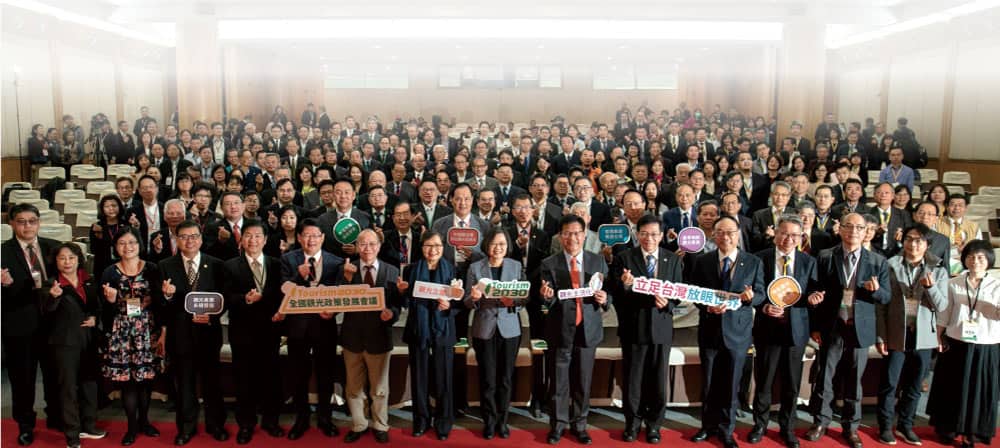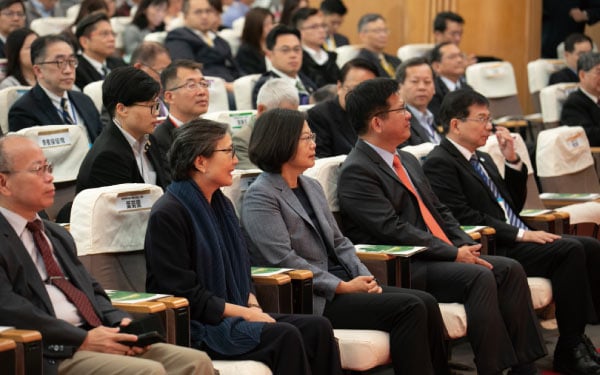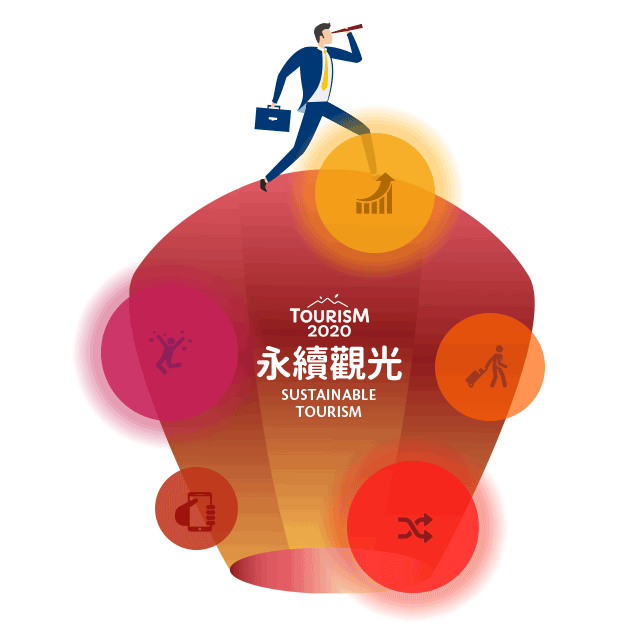
Outlook
Tourism2020—Taiwan Sustainable Tourism Development Plan
The Tourism Bureau continued to implement a program involving five strategies to create an innovative, sustainable, localized, and happy industry, to diversify and add value in the tourism industry, and provide a safe environment to fulfill tourism social responsibility. This program aimed to develop and diversify international markets and strengthen the base of domestic tourism and make Taiwan an important "friendly, smart, and experiential" tourist destination in Asia. These initiatives also sought to actively create a positive cycle of tourism development in Taiwan and spur the development of the local economy and peripheral industries.
Expanding and Diversifying Markets
- Deepen the image of Taiwan's tourism brand and solidify major source markets through precision marketing, simplified visa procedures, innovative marketing, incentives, and cross-industry cooperation in ten key countries.
- Actively develop local characteristics and diverse, thematic, and in-depth experiential free independent travel to generate tourism benefits throughout Taiwan.
- Develop high potential visitor sources by expanding cooperation with the Asian Cruise Cooperation (ACC) to attract cruise, MICE, Muslim, charter flight, and study tours.
Invigorating Domestic Travel
- Inject new momentum into the tourism industry by offering preferential tours, scaling up events, and developing regional tourism.
- Continue to promote the New National Travel Card System, encourage National Travel Card merchants to accept mobile payment, and expand payment locations.
- Assist travel agencies in developing package tours for in-depth and specialty domestic travel, strengthen city marketing and promote the Time for Celebration: Taiwan Tourism Events and cross-region overnight tours to increase domestic travel consumption.
Guiding Industry Transformation
- Promote measures to optimize service quality, provide guidance to travel agencies in branding and developing digital operations, assist hotels in transformation and quality improvement, research deregulation in response to the sharing economy and young entrepreneurial local guides, while taking into account the needs of tourism safety management, and strengthen management of illegal hotels.
- Provide incentives and guidance in diversified development of the tourism industry to develop multifaceted travel products and create more job opportunities.
Developing Smart Tourism
- Establish a big data database on Taiwan tourism, comprehensively integrate tourism industry information networks, strengthen tourism information applications and visitor behavior analysis, and guide the industry in development of value-added application services.
- Use smart technology and mobile device technology to improve the quality of Taiwan Tourist Shuttle and Taiwan Tour Bus travel services, enhance the functions of travel service centers, and strengthen information services for independent travelers.
Expanding Experiential Tourism
- Promote Year of Mountain Tourism and Small Town Ramble 2.0 annual tourism themes and develop local specialty tours.
- Continue to implement the Medium-term Construction Plan for Major Tourist Sites (2020-2023), create one distinguishing feature for each national scenic area, and create a senior-friendly, barrier-free tourism environment.
- Implement the Plan for the Development of Local Travel Environments for Experiential Tourism and Plan for the Improvement of Tourism Environments at Spotlight Scenic Areas, assist local governments with key investment and environmental reform, and upgrade the overall quality of tourism services.
Tourism 2030
National Tourism Policy Development Conference
2030 Year of Mountain Tourism
In order to reposition the role of tourism development, Taiwan has promoted the belief that everyone should have tourism promotion in their mind and that all of the government ministries should work together to promote tourism. It is hoped that this will make Taiwan tourism a part of mainstream society and an engine that will drive the country's economic development. As a result, the Bureau is planning the "2030 Taiwan Tourism Policy White Paper," which will guide Taiwan’s tourism development at a national level for the next 10 years.After a period of study and series of consultation meetings, the Tourism Bureau invited President Tsai Ing-wen, Minister without Portfolio Chang Jing-sen, Senior Advisor to the President and Chairwoman of the Taiwan Visitors Association Yeh Chu-lan, Minister of Transportation and Communications Minister Lin Chia-lung and more than 300 national tourism industry and government elites to attend the Tourism 2030: National Tourism Policy Development Conference on December 16, 2019. Six major principles and directions outlined below were identified to resolve current issues facing tourism industry development with innovative thinking and pragmatic approaches under a jointly planned blueprint for Taiwan's tourism development over the next 10 years, with aims to integrate national strengths for tourism development and create an output value of NT$1 trillion.
Implement tourism mainstreaming under the vision of a "tourism-based country"
- Upgrade the Tourism Bureau to a "Tourism Administration" and research and formulate the Tourism Development Act and regional tourism development organizations.
- Increase the number of visitors to Taiwan to 20 million, the number of domestic visits to 240 million, and total output (consumption) of NT$1.7 trillion for international and domestic tourists by 2030.
Shaping Taiwan's regional brand and establishing sea and air support systems
- Develop Taiwan's regional brand in major, potential, and specific international markets and introduce promotion measures to encourage domestic tourism.
- Establish and deploy sea and air support systems for international marketing of Taiwan tourism, improve specialized marketing strategies by the central, county, and city governments, industry associations, and regional tourism organizations, and invest in international tourism promotion resources and inter-agency integration to expand the tourism market.
Strengthen digital services and accelerate platform development
- Continue to strengthen digital education and transformation in the tourism industry and tourist information services in multiple languages
- Introduce ticket integration, mobile payment, and online booking functions to enhance passenger convenience and friendliness and establish models for user-centric mobile services for integrated transportation.
- Accelerate government and private sector development of transparent and mutually beneficial social network platforms in response to current digital development trends.
Integrate organizations to strengthen capacity and rolling optimization management systems
- Assist travel agencies in adopting digital applications and developing suitable business models, travel platform operations, off-campus teaching (internships), travel agency matchmaking, and overseas marketing.
- Deliberate a suitable notice period for strikes in the aviation and public transportation sectors to protect traveler rights and interests.
- Strengthen industry-academia linkage mechanisms, bolster tourism talent, and establish a platform for tourism human resource matching.
Strengthen guidance and management mechanism and improve the investment and business environment
- Promote unification of hotel industry management laws and improve division-of-labor mechanisms for hotel industry training and certification.
- Guide the tourism industry in integrating digital applications, improve the quality of tourism services through thematic differentiation, brand image deepening, and development of specialty products.
- Create a sound investment and business environment for the tourism industry to facilitate industry development.
Establish inter-agency cooperation mechanisms to create new international tourism highlights
- Establish an inter-agency tourism platform and cooperation mechanism joining ministries and local governments to develop and improve scenic site facilities and services.
- Apply technology and modern information systems to create a friendly and smart tourism environment.
- Strengthen development of sea, land, air, mountain, and railway tourism resources and introduce the concept of design aesthetics in the transformation and preparation of scenic area environments to create regional tourism domains and new international tourism highlights.
2017
Year of Eco Tourism
2018
Year of Bay Tourism
2019
Year of Small Town Ramble
2020
Year of Mountain Tourism
2020 Year of Mountain Tourism
In line with the global trend of sustainable tourism development, the Tourism Bureau promoted the "Tourism 2020: Taiwan Sustainable Tourism Development Plan" and designated travel themes for each year between 2017 to 2020. For the Year of Mountain Tourism in 2020, the bureau is promoting a marketing strategy focused on mountaineering activities and mountain tourism. It aims to turn Taiwan into a well-known international mountaineering and mountain tourism destination, attract international visitors to Taiwan, develop Taiwan's mountain brand, and present Taiwan to the world.
To attract international visitors to Taiwan for mountain climbing and promote the sustainable development of Taiwan tourism, the Tourism Bureau will partner with related competent authorities to support joint promotion of mountaineering activities. The following focal work will be promoted:
Planning Classic Routes:
The Tourism Bureau held the Second Academic and Expert Working Consultation Meeting for the 2020 Year of Mountain Tourism. The meeting inventoried 12 classic routes (five mountain climbing routes and seven mountain tourism routes). The bureau focused on management of marketing rights for the seven mountain tourism routes. It entrusted the Taiwan Ecotourism Association to conduct a 2020 Mountain Tourism Route Selection Survey and Tour Plan. Seven classic mountain routes were proposed. They were further divided into 25 mid-elevation routes and eight derivative routes integrating local characteristics.
Preparation of Environmental Resources:
Environmental resources will be prepared through an inventory of hotel resources, promotion of local tours, and integration of transportation means.
Adding Value through Industry Integration:
- Dining: Integrate specialty food products and promote local cuisine.
- Shopping: Promote specialty souvenirs and increase local consumption.
Multi-level Marketing
-International Marketing and Promotion
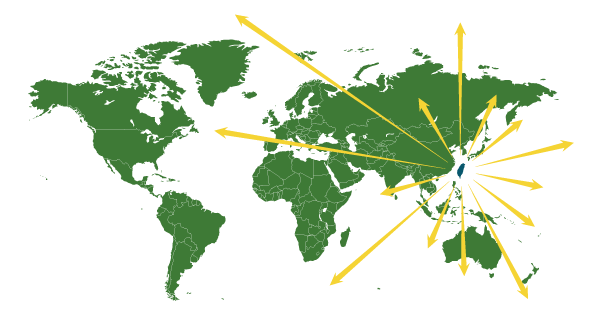
Strengthen reporting and exposure by international print and electronic media visiting Taiwan, assist travel agencies to visit Taiwan to learn about new product packaging and marketing, arrange industry briefings for major customer sources and high potential visitor source markets, and advertise through global media platforms.
-Domestic Market Promotion
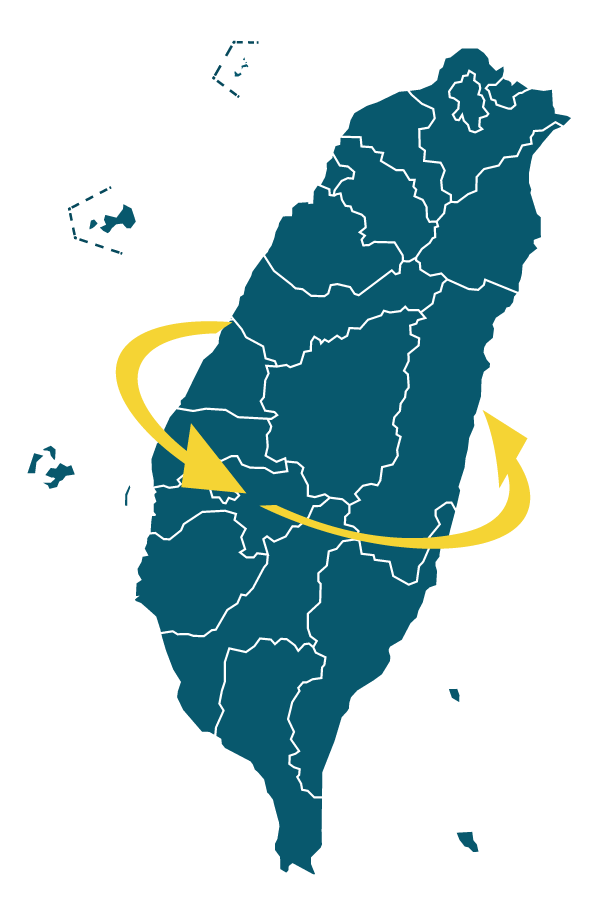
1.Hold the Taiwan Modern Tourism Forum (TMTF) under the themes of “Ecotourism” and “Mountain Tourism.”
2.Publicize the Year of Mountain Tourism at a Mountain Image Pavilion jointly arranged with related ministries and departments at the Taipei International Travel Fair (ITF).
3.Hold the 2020 Year of Mountain Tourism: Climb with OhBear Grand Mountain Tour activity to promote the atmosphere for in-depth mountain travel in 2020.
-Digital and Internet Marketing

1.Establish the Year of Mountain Tourism website.
2.Market the Year of Mountain Tourism on the Touris Bureau’s social platforms.
3.Produce Year of the Mountain Tourism videos.
4.Jointly market through links on the websites of other agencies, associations, and mountaineering platforms.

